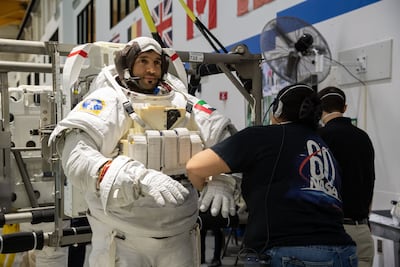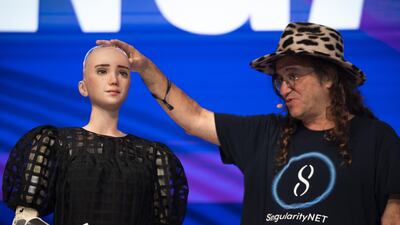Adaptability, curiosity and creativity. These three traits have defined humanity for millennia. They have fuelled great technological leaps, from groundbreaking inventions such as the printing press and the telegraph, to life-changing discoveries such as antibiotics and awe-inspiring achievements such as space travel.
Today, technology has become deeply ingrained in our lives, and by 2030 humans will rely even more on it. But are our values changing to suit new societal frameworks shaped by technology at a speed to match? And will the defining characteristics of humanity be different by the end of the decade?
I think not. Rather, the things that make humans human will persist, even as society evolves in the face of advancing technology and challenges around climate, health and the economy. This is the central premise of the upcoming Dubai Future Forum, which is set to host the world’s largest gathering of futurists on October 11-12 at the Museum of the Future.
Set against this era of rapid transformational change, marked by unprecedented environmental degradation and socioeconomic disruption, the Future Forum will make the case that our ability to adapt, question, innovate and create has never been more important.
As people, governments and as a global community, we must remember this in the coming decades when we are faced with tough questions about ourselves, our place on this planet and perhaps beyond.
These questions will stem from advancements across every sphere. For instance, as robotics progresses and sentient artificial intelligence becomes a real possibility, we must consider new ethical perspectives. If we are going to co-exist with beings and consciousnesses that we have created and are responsible for, we will need to re-assess our values.
Health is a particularly important space when it comes to humanity’s perception of itself. Our approach to it is already changing as mental well-being comes to the fore. But more drastic developments such as genetic mapping and modification raise significant ethical questions around disease eradication, longevity and the concept of "designer babies", where parents might one day choose genetic features of their children.
Then there is the future of jobs. There is no question that advanced technologies make organisations greener, more efficient and more productive. But without taking proper action now to upskill workforces, organisations and countries risk a skills chasm that could stall whole sectors. There is also the issue of potential human obsolescence to consider when we think about AI’s expanding role in the labour market.
Whether we like it or not, our future is being shaped by the technologies we are pioneering today. Most people would agree that technological advancement is necessary for humanity’s progression. Indeed, it is essential to our survival in terms of climate and resource-shortage problems.
As the Fourth Industrial Revolution marches on, we are presented with a fine balancing act, and humanity caught in the middle. We – governments, organisations and individuals – must be ready to adapt to a world that we have shaped, yet, paradoxically, have less and less control over. We must revisit our moral codes and ideals. Only then can we overcome the challenges before us and drive positive, sustainable human development.
But to do this, we require an open dialogue between societies around the world. Deliberating, discussing and determining in silos is not the optimal approach to ensuring humanity can thrive in tomorrow’s world. Collaboration and knowledge sharing – two things that have historically driven our evolution and progression – are critical.

And while it is people who are responsible for discussing and forging the values they live by, it largely falls on governments to facilitate constructive and actionable exchanges between peoples.
Dubai’s government has taken the lead in enabling and supporting these important citizen-led discussions. By building the Museum of the Future and through hosting events such as the Future Forum, Dubai is positioning itself as a platform for debate and collaboration.
With some of the earliest evidence of humans discovered on the Arabian Peninsula, Dubai is a fitting place for humanity to explore its challenges, its opportunities and its future. When we welcome 400 futurists next week, we aim to drive discussions on shaping the next four decades, as well as explore the shifts in our social and value systems in the face of emerging technologies.
These discussions will undoubtedly help us to leverage technology to address challenges around fragile ecosystems, global food security, inequalities, supply chains and increasingly extreme weather events. But they will ultimately underline the importance of humanity’s innate traits in overcoming our shared challenges and hopefully transforming them into opportunities.
In the future, regardless of the changes we experience and introduce, it will be our core attributes that have served us for so long that will enable course corrections. It is our characteristics of adaptability, curiosity, creativity and problem solving, combined with our ability to dream big and apply foresight that will help us to build the foundations for a brighter tomorrow.
While we might adopt new social and value systems, it is these core qualities that continue to define what it means to be human as the world around us is transformed.


